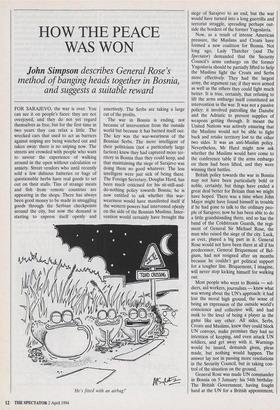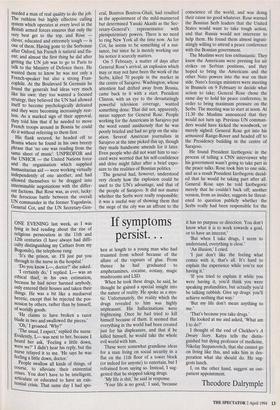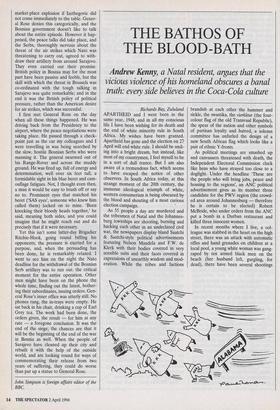HOW THE PEACE WAS WON
John Simpson describes General Rose's
method of banging heads together in Bosnia, and suggests a suitable reward
FOR SARAJEVO, the war is over. You can see it on people's faces: they are not overjoyed, and they do not yet regard themselves as free, but for the first time in two years they can relax a little. The wrecked cars that used to act as barriers against sniping are being winched out and taken away: there is no sniping now. The streets are crowded with people who want to savour the experience of walking around in the open without calculation or anxiety. Street vendors who until recently sold a few dubious batteries or bags of questionable herbs have real goods to set out on their stalls. Tins of strange meats and fish from remote countries are appearing in the shops. There has always been good money to be made in smuggling goods through the Serbian checkpoints around the city, but now the demand is starting to express itself openly and assertively. The Serbs are taking a large cut of the profits.
The war in Bosnia is ending, not because of intervention from the outside world but because it has burned itself out. The key was the war-weariness of the Bosnian Serbs. The more intelligent of their politicians (not a particularly large faction) knew they had captured more ter- ritory in Bosnia than they could keep, and that maintaining the siege of Sarajevo was doing them no good whatever. The less intelligent were just sick of being there. The Foreign Secretary, Douglas Hurd, has been much criticised for his sit-still-and- do-nothing policy towards Bosnia; he is now entitled to ask whether this war- weariness would have manifested itself if the western powers had intervened openly on the side of the Bosnian Muslims. Inter- vention would certainly have brought the 'He's fitted with an airbag!' siege of Sarajevo to an end, but the war would have turned into a long guerrilla and terrorist struggle, spreading perhaps out- side the borders of the former Yugoslavia.
Now, as a result of intense American pressure, the Muslims and Croats have formed a new coalition for Bosnia. Not long ago, Lady Thatcher (and The Spectator) demanded that the Security Council's arms embargo on the former Yugoslavia should be partially lifted to help the Muslims fight the Croats and Serbs more effectively. They had the largest army, the argument ran; if they were armed as well as the others they could fight much better. It is true, certainly, that refusing to lift the arms embargo itself constituted an intervention in the war. It was not a passive policy: it involved patrolling the Danube and the Adriatic to prevent supplies of weapons getting through. It meant the United Nations was actively ensuring that the Muslims would not be able to fight back and retake territory lost to the other two sides. It was an anti-Muslim policy. Nevertheless, Mr Hurd might now ask whether the Muslims would have come to the conference table if the arms embargo on them had been lifted, and they were winning their battles.
British policy towards the war in Bosnia may not have been particularly bold or noble, certainly; but things have ended a great deal better for Britain than we might have hoped. There was a time when John Major might have found himself in trouble if he had gone to talk to the ordinary peo- ple of Sarajevo; now he has been able to do a little grandstanding there, and so has the band of the Coldstream Guards, the regi- ment of General Sir Michael Rose, the man who raised the siege of the city. Luck, as ever, played a big part in it. General Rose would not have been there at all if his predecessor, General Briquemont of Bel- gium, had not resigned after six months because he couldn't get political support for a tougher line. Briquemont, I imagine, will never stop kicking himself for walking out.
Most people who went to Bosnia — sol- diers, aid workers, journalists — knew what was wrong about the UN's approach: it had lost the moral high ground, the sense of being an expression of the outside world's conscience and collective will, and had sunk to the level of being a player in the game like any other. All sides, Serbs, Croats and Muslims, knew they could block UN convoys, make promises they had no intention of keeping, and even attack UN soldiers, and get away with it. Warnings would be issued, demands given, pleas made, but nothing would happen. The answer lay not in passing more resolutions in the Security Council, but in taking con- trol of the situation on the ground.
General Rose was made UN commander in Bosnia on 5 January: his 54th birthday. The British Government, having fought hard at the UN for a British appointment, needed a man of real quality to do the job. The ruthless but highly effective culling system which operates at every level in the British armed forces ensures that only the very best get to the top, and Rose clever, educated and extremely tough — is one of them. Having gone to the Sorbonne after Oxford, his French is natural and flu- ent; and almost the first thing he did after getting the UN job was to go to Paris to talk to the Ministry of Defence there. He wanted them to know he was not only a French-speaker but also a strong Fran- cophile. At the Boulevard St Germain he found the generals had ideas very much like his own: they too wanted a focused strategy, they believed the UN had allowed itself to become psychologically defeated and they were becoming increasingly rest- less. As a marked sign of their approval, they told him that if he needed to move French troops around in Bosnia he could do it without referring to them first. His flank secured, he headed off to Bosnia where he found in his own breezy phrase that `no one was reading from the same sheet of music'. UNPROFOR and the UNHCR — the United Nations force and the organisation which supplied humanitarian aid — were working virtually independently of one another, and had allowed themselves to be dragged into interminable negotiations with the differ- ent factions. But Rose was, as ever, lucky: the ferocious battle between the overall UN commander in the former Yugoslavia, General Cot, and the UN Secretary-Gen- eral, Boutros Boutros-Ghali, had resulted in the appointment of the mild-mannered but determined Yasuki Akashi as the Sec- retary-General's representative with plenipotentiary powers. There is no need to ring New York all the time now. As for Cot, he seems to be something of a nui- sance, but since he is merely working out his notice it scarcely matters.
On 5 February, a matter of days after General Rose's arrival, an explosion which may or may not have been the work of the Serbs, killed 70 people in the market in the centre of Sarajevo. Washington, whose attention had drifted away from Bosnia, came back to it with a start. President Clinton, with an eye to the devastatingly powerful television coverage, wanted something done. That did not, apparently, mean support for General Rose. People working for the Americans in Sarajevo put the word round assiduously that he was poorly briefed and had no grip on the situ- ation. Several American journalists in Sarajevo at the time picked this up, though they made handsome amends for it later. Even people who did not want him to suc- ceed were worried that his self-confidence and drive might falter after a brief expo- sure to the realities of Bosnian politics.
The general had, however, understood very clearly how the explosion could be used to the UN's advantage, and that of the people of Sarajevo. It did not matter whether the Serbs were really responsible; it was a useful way of showing them that the siege of the city was an affront to the conscience of the world, and was doing their cause no good whatever. Rose warned the Bosnian Serb leaders that the United States would want to take tough action, and that Russia would not intervene to help them. He found them almost ingrati- atingly willing to attend a peace conference with the Bosnian government.
The Muslims were less enthusiastic. They knew the Americans were pressing for air strikes on Serbian positions, and they hoped to bring the Americans and the other Nato powers into the war on their side. Nato's foreign ministers were meeting in Brussels on 9 February to decide what action to take; General Rose chose the same day to hold his peace conference, in order to bring maximum pressure on the Serbs. The meeting was to start at noon. At 11.30 the Muslims announced that they would not turn up. Previous UN comman- ders would have kicked the woodwork, or merely sighed; General Rose got into his armoured Range-Rover and headed off to the Presidency building in the centre of Sarajevo.
He found President Izetbegovic in the process of telling a CNN interviewer why his government wasn't going to take part in the peace talks. Rose took him to one side, and as a result President Izetbegovic decid- ed that he would be taking part after all. General Rose says he told Izetbegovic merely that he couldn't back off; another version, from an insider, suggests he threat- ened to question publicly whether the Serbs really had been responsible for the market-place explosion if Izetbegovic did not come immediately to the table. Gener- al Rose denies this categorically, and the Bosnian government doesn't like to talk about the entire episode. However it hap- pened, the peace talks did take place, and the Serbs, thoroughly nervous about the threat of the air strikes which Nato was threatening to carry out, agreed to with- draw their artillery from around Sarajevo. They even carried out their promise. British policy in Bosnia may for the most part have been passive and feeble, but the skill with which the threat in Brussels was co-ordinated with the tough talking in Sarajevo was quite remarkable; and in the end it was the British policy of political pressure, rather than the American desire for air strikes, which was successful.
I first met General Rose on the day when all these things happened. He was driving back from the Presidency to the airport, where the peace negotiations were taking place. He passed through a check- point just as the car my colleagues and I were travelling in was being searched by the slow, hostile Bosnian Serbs who were manning it. The general swarmed out of his Range-Rover and across the muddy ground. He was fired up, full of energy and determination, well over six feet tall, a formidable sight in his blue beret and cam- ouflage fatigues. Not, I thought even then, a man it would be easy to brush off or say no to. Prominent eyes that matched his beret ('SAS eyes', someone who knew him called them) locked on to mine. 'Been knocking their bloody heads together,' he said, meaning both sides, and you could imagine that he might reach out and do precisely that if it were necessary.
Yet this isn't some latter-day Brigadier Ritchie-Hook, going round biffing his opponents; the pressure is exerted for a purpose, and, when the persuading has been done, he is remarkably relaxed. I went to see him on the night the Nato deadline for the withdrawal of the Bosnian Serb artillery was to run out: the critical moment for the entire operation. Other men might have been on the phone the whole time, finding out the latest, bother- ing their subordinates, issuing orders. Gen- eral Rose's inner office was utterly still. No phones rang, the in-trays were empty. He sat back in his chair, drinking a cup of Earl Grey tea. The work had been done, the orders given, the result — for him at any rate — a foregone conclusion. It was the end of the siege; the chances are that it will be the beginning of the end of the war in Bosnia as well. When the people of Sarajevo have cleaned up their city and rebuilt it with the help of the outside world, and are looking round for ways of commemorating their release from two years of suffering, they could do worse than put up a statue to General Rose.
John Simpson is foreign affairs editor of the BBC.




























































 Previous page
Previous page